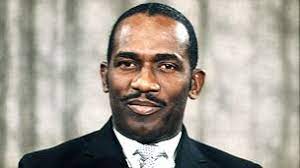Sir Eric Matthew Gairy, born on February 18, 1922, in St. Andrew’s, Grenada, was a prominent Grenadian politician and trade unionist. His contributions to the nation’s political landscape, his advocacy for workers’ rights, and his tenure as the first Prime Minister of Grenada make him a significant figure in the country’s history.
Gairy’s early life was marked by humble beginnings. He grew up in a working-class family and experienced firsthand the challenges faced by laborers in Grenada. After completing his education, Gairy migrated to Aruba to find work in the booming oil industry. While in Aruba Gairy got involved in labor union activities. It was during this time that he became acutely ware of the pressing issues surrounding workers’ rights, which would shape his future endeavors.
Inspired by the plight of the working class, Gairy returned to Grenada and established the Grenada Manual, Maritime and Intellectual Workers’ Union in 1950. Gairy’s tireless efforts in mobilizing workers and advocating for their rights quickly gained him prominence within the labor movement. His fiery speeches and passionate commitment to improving the lives of laborers earned him respect and support.
Building on his success as a labor leader, Gairy ventured into politics. In 1951, he founded the Grenada United Labour Party (GULP) and contested the elections. His party emerged victorious, propelling Gairy into the Legislative Council of Grenada. Throughout the 1950s and early 1960s, Gairy consolidated his political influence and continued to champion the cause of workers.
In 1961, Gairy reached a significant milestone when he was elected Chief Minister of Grenada. His tenure in this position lasted until Grenada achieved full independence from Britain in 1974. Under Gairy’s leadership, the country underwent significant social and economic transformations.
As Prime Minister, Gairy implemented various progressive policies aimed at improving the lives of Grenadians. He prioritized education and healthcare by constructing new schools and hospitals across the nation. Gairy also played a pivotal role in establishing a national insurance scheme to provide social security to the population. Furthermore, he sought to diversify the country’s economy and boost tourism, recognizing its potential as a vital source of revenue and employment.
Gairy’s leadership was not limited to social and economic development. He worked tirelessly to promote Grenada’s cultural heritage and national identity. During his tenure, Grenada adopted a national flag and anthem, symbolizing the country’s sovereignty and pride. Gairy also took initiatives to preserve and celebrate Grenadian traditions, fostering a sense of unity and patriotism among the people.
However, Gairy’s rule was not without controversy. His close ties with the United States and his vocal support of African liberation movements drew criticism, with some accusing him of diverting attention from domestic issues. Additionally, allegations of autocracy and corruption tarnished his reputation and sparked discontent among sections of the population.
In 1979, Gairy’s rule came to an abrupt end when he was overthrown in a coup orchestrated by Maurice Bishop and the New Jewel Movement. Following the coup, Gairy sought refuge in the United States, where he continued to advocate for Grenadian independence and democracy. Despite being out of power, he remained an influential figure in Grenadian politics, using his platform to raise awareness about the situation in his homeland.
In recognition of Sir Eric Gairy service to Grenada the Government bestowed him the honor of the Father of Independence. The Ministerial Complex has been named the Sir Eric Gairy Botanical Garden Ministerial Complex with a statue of Sir Eric at the entrance.
Sir Eric died quietly in his sleep on August 23, 1997 and was given a state funeral. As with most revolutionary politicians some people will love him passionately while others hate every bone in him. Regardless of what ones view of Sir Eric Gairy his contributions to Grenada and the Caribbean will never be forgotten.
By T.L. Neckles
Originally written August 10, 2002
Updated July 15, 2023

